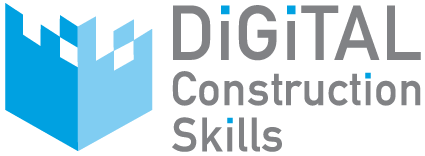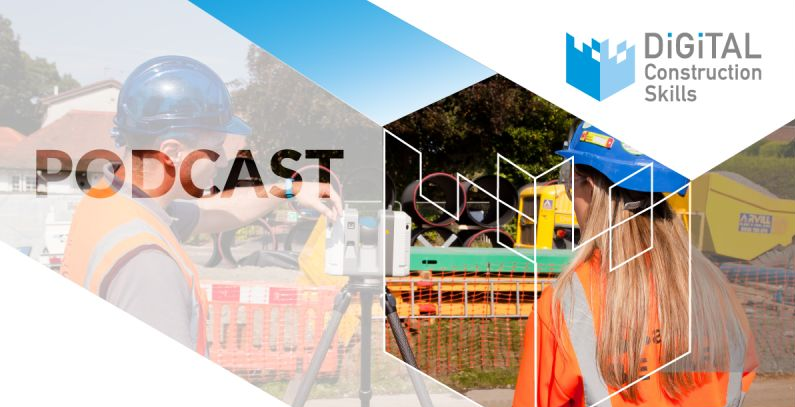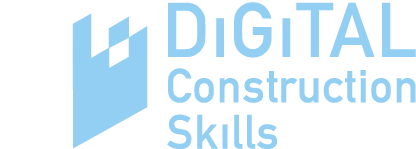What is the wider impact of digital transformation in the construction industry?
I was privileged to be invited to RSA Scotland to present an online talk on this subject recently. It was wonderful to have such mixed audience of construction and non-construction people. The topic generated a great discussion about some of the benefits of and barriers to digital adoption within the industry.
Rather than posting the transcript in its raw form, I’ve summarised it in this blog post which I hope you’ll find interesting. If you’d prefer listen to the talk, the 15-minute audio is here:
The Digital Transformation through Leaders project
Digital Construction Skills have been awarded £290k in funding from CITB, with further contributions worth £140k from our 40 fabulous project partners , for the Digital Transformation through Leaders project. The aim of the project is to give construction industry leaders and managers the skills they need to drive digital transformation in their organisations.
The project involves:
- The design and roll-out five training courses
- Five eLearning modules
- Bespoke digital strategy days for 80 construction companies
- Technology demonstration days
- Round-table discussions
- An online decision matrix to help companies work out the best tools to get started with, based on their priorities
- An online diagnostic tool to help organisations assess their digital strengths and weaknesses.
The project is focussed in Scotland and aims to:
- Reach over a 1000 people through the eLearning and online tools and over 400 people through face-to-face training
- Help 80 companies to develop a digital strategy through face-to-face support.
There’s a slight technicality in that CITB have unfortunately had to suspend the funding for at least a year, so we’re busy trying to find a different model to make this work.
So let give me give a bit of wider context about why the project will benefit not just in the construction industry, but everybody.
Do you see yourself as a stakeholder in the construction industry?
Would you class yourself as a direct stakeholder in the NHS? Most people will answer ‘Yes!’ to this question.
Would you class yourself as a direct stakeholder in the education system? Again, most people, even if they are not a child at school or a parent of a child, will see how they are affected by the education system.
But would you class yourself as a direct stakeholder in the construction industry? Unless you work in the industry or are a direct client or supplier to the industry, the answer is probably ‘No’.
Why is that many of us don’t feel invested in the construction industry in the same way we do in other things like health, transport and the welfare system?
Why is it that we don’t weigh-in on the debate the way we do with other issues? When was the last time you were putting the world to rights with a friend over a coffee or a beer and you found yourselves thrashing out your views on what’s gone wrong with the construction industry and how it should be done instead? Unless you work in the construction industry, the answer’s likely never.
But what if I was to tell you that:
- £110 billion is spent on construction each year and roughly £30 billion of that is public money?
- Construction accounts for 7% of GDP and provides jobs for two and a half million workers – 9% of the workforce?
- Of those two and a half million workers, only 10% of them are women and that drops to 3% when it comes to manual trades?
- 5% are black, Asian or minority ethnic verses 13% of the population?
- Construction is one of the biggest contributors to climate change (one recent study suggested that up to 50% of climate change is due to construction)?
- The industry generates an estimated 50,000 tonnes of plastic packaging a year – more than three times the total packaging waste of UK households combined?
- In Scotland, construction activity accounts for 50% of all energy and 50% of all waste?
- 72 people died in the Grenfell disaster?
- More than one construction worker per day takes their own life, which is more than three times the national average?
Do you still feel it’s none of your business? Do you still feel it’s not your debate or that you’re not qualified to comment? That it’s ‘not your counter’?
I’m not going to use this blog to tell you about all the advanced technology and how it’s revolutionising the industry. There’s no doubt some amazing things are happening but, on the flip side of the coin, I don’t think we can be patting ourselves on the back so soon. A recent report by McKinsey showed that the construction industry is the least digitised industry after only hunting and agriculture.
What I’m going to focus on here is how digital transformation in the construction industry has the potential to impact not the workers and companies who operate directly within it, but how it impacts on society and the economy and why it’s everybody’s business to get involved.
Eight ways technology in the construction industry affects us all
Here are eight different ways that better use of digital technology could have a wider impact.
#1: Digital transformation can improve diversity in the industry
If all processes are digitalised, from site diaries to risk assessments, method statements, to snagging, then it makes job-sharing much more feasible. That makes the industry more accessible to parents who don’t want to – or don’t have the option to – work 60 hours a week on site.
Technology such as immersive photography means a whole site can be captured in 3D reality, and can be navigated remotely in the same way you use Google Streetview. That means you don’t need to be physically present on the site. That means less travel time and fewer nights away from home. This makes a career in construction more family-friendly and also makes construction sites accessible to those who are mobility-impaired.
#2: Digital tools in construction can benefit the environment
Digital tools can be used for:
- Waste monitoring
- Vehicle tracking
- Emissions tracking
- PPE tracking (digital tracking of PPE can lead to up to a 25% reduction in waste).
Digital design and management tools have been shown to offer a 15% reduction in materials and up to a 50% reduction in carbon.
#3: Digital tools can improve efficiency and productivity
Considering that £30 billion pounds of public money is spent on construction, don’t we want to know that every penny of that is being used efficiently?
#4: Digital tools can aid resilience
There’s a strong link between a construction company being digitally enabled and its competitiveness and resilience. Any construction company that allows itself to be vulnerable and puts itself at risk of collapse because of failure to modernise is putting its employees’ stability at risk. When a construction company collapses or has to make job cuts, a significant proportion of those impacted are low paid workers.
#5: Improving the safety of workers
There are dozens of ways digital tools can improve safety; here are just a few examples:
- Machine control means that the excavator driver can see the digital 3D ground model on a display model in their cab. That means you don’t need engineers moving about in proximity to the excavators or climbing down into dangerous excavations to mark out levels and positions.
- Cable avoidance tools can store usage data to ensure that they’re being used correctly. If they’re not, the relevant training can be given to the operator.
- Fatigue monitoring can prevent accidents caused by tiredness or overwork.
#6: Maintaining the mental health and wellbeing of workers
Digitalising processes means less time is wasted on time-consuming, mundane paperwork, freeing up site managers to do more thinking ahead and planning. As well as alleviating short-term stress, this leads to better engagement and job satisfaction.
Mental health management software can help provide coping skills or give workers resources to help them with specific issues that they might not necessarily want to discuss with a colleague or a manager. They can also help employers make sure they’re doing right by their workers as well as keeping on the right side of the law.
#7: Aiding people-development and the future of work
Competency-mapping software can help a company or a project understand any skill or competency gaps at an individual level and an organisational level. This means workers can reach their potential and organisations can recruit the right people.
Using this software, employers can help to develop their employees so they are more valuable and therefore have better job security.
We need to use digital tools to help us prepare for the future of work. We need to make it part of our plan, rather than something we are forced into when we no longer have an option.
#8: Digital tools and data gathering
This arguably is the most important one of all. Digital tools can help us collect vital data as an industry. We can collect information about:
- Environmental performance
- Safety performance
- Diversity
- Mental health
- Efficiency/productivity
- Quality
- Resilience.
This is how, as an industry, we can make ourselves accountable and transparent. That’s how we can start to build trust and engagement with the public.
What should be our guiding stars?
There are many reasons why the construction industry is so far behind the times, and plenty of barriers to be overcome, and I’m not going to go into them all now.
I do want to mention one important barrier, though, and it’s to do with the direction of motivation . The prevalent mindset in the construction industry is ‘away from’ thinking rather than ‘toward’ thinking. In other words, we’re driven by avoiding bad things happening rather than working towards good things happening. This mindset has come about as a necessity; there has been a need for survival. But it’s become out of balance – to the detriment of the industry.
We need to be thinking in the opposite direction. We need to be asking:
- Not ‘What do we want to avoid?’ but ‘What would we like to have happen?’
- Not ‘What is wrong with the industry?’ but ‘What is important to us as an industry?’
- Not ‘What cost or time overrun are we currently trying to avert?’ but ‘Who are we serving?’ and ‘What is our purpose?’
Most of all , we need to be asking ‘What have we got to gain by inviting the outside world in? By making ourselves transparent? By making ourselves accountable? By showing the public that they can trust us – that they can have access to the data and see how we’re doing?’
We should be happy to collect and share that data – not because it’s going to make us look good, because we know that, at first, it might not. But, until we reach that basecamp, we can’t begin to climb the mountain. The construction industry needs to be more open to working with other sectors to learn from and invite help from other industries.
If you’re a stakeholder in the construction industry (which by now I hope everyone feels they are), and if you want to make it your business to get into the nuts and bolts of this formidable industry and help us navigate the landscape and be a force for good, get in touch. Let’s work out a plan together.
Find more information…
The post What is the wider impact of digital transformation in the construction industry? appeared first on Digital Construction Skills.


